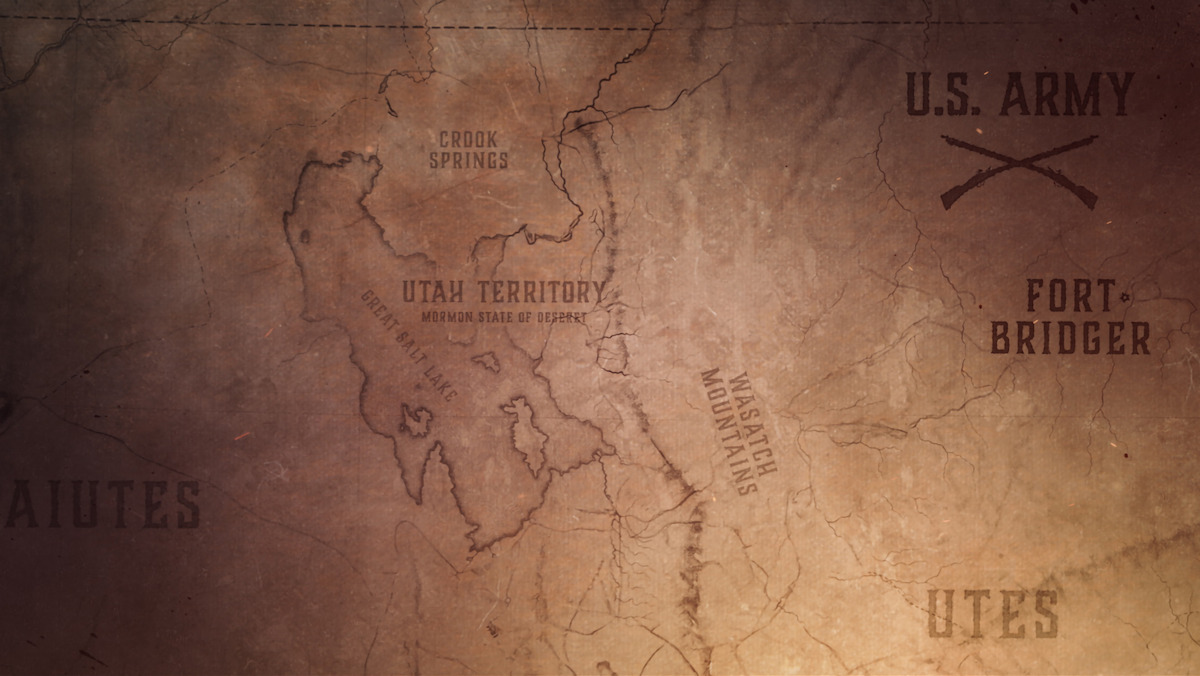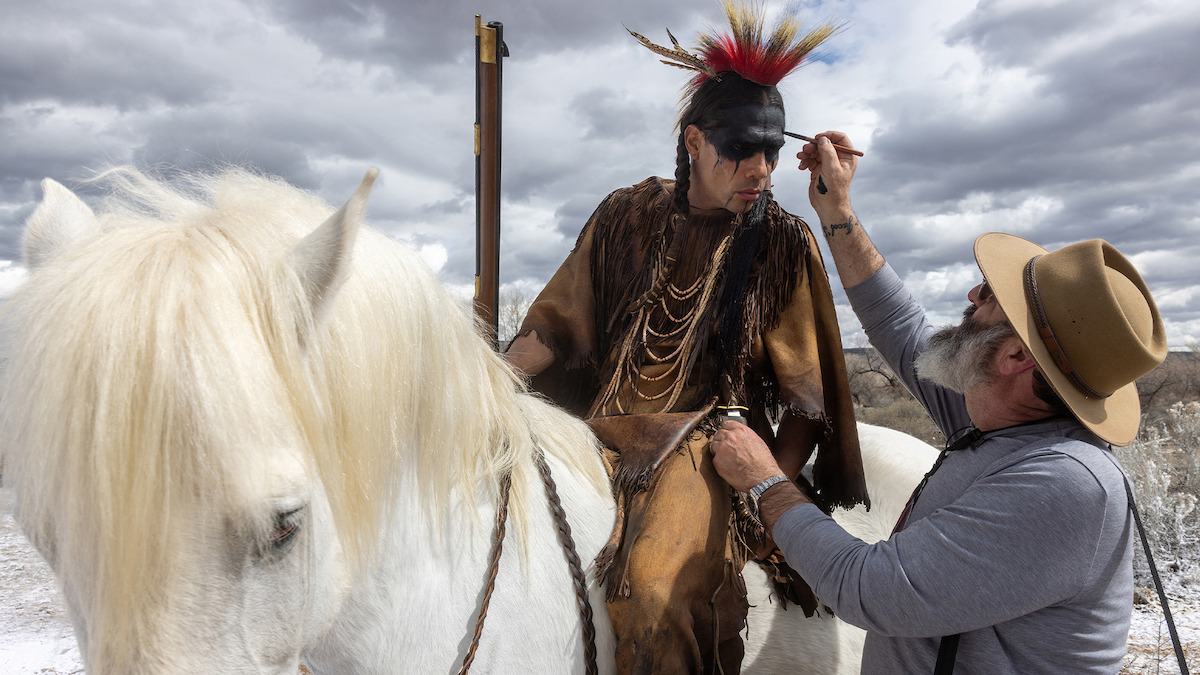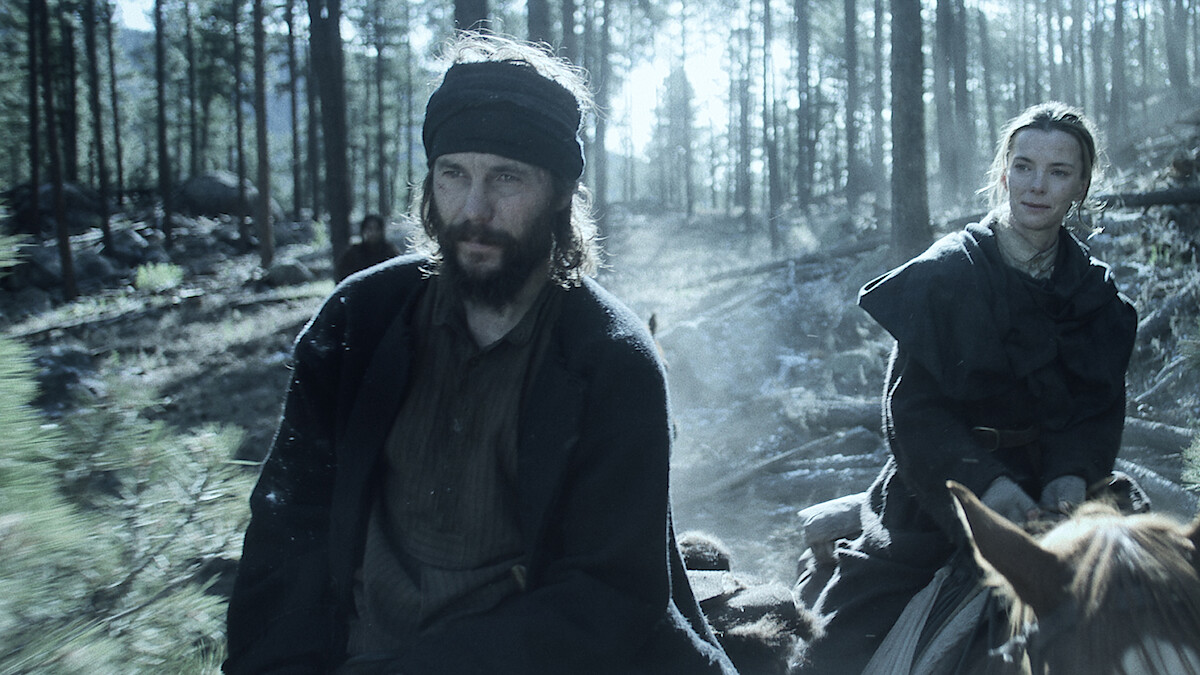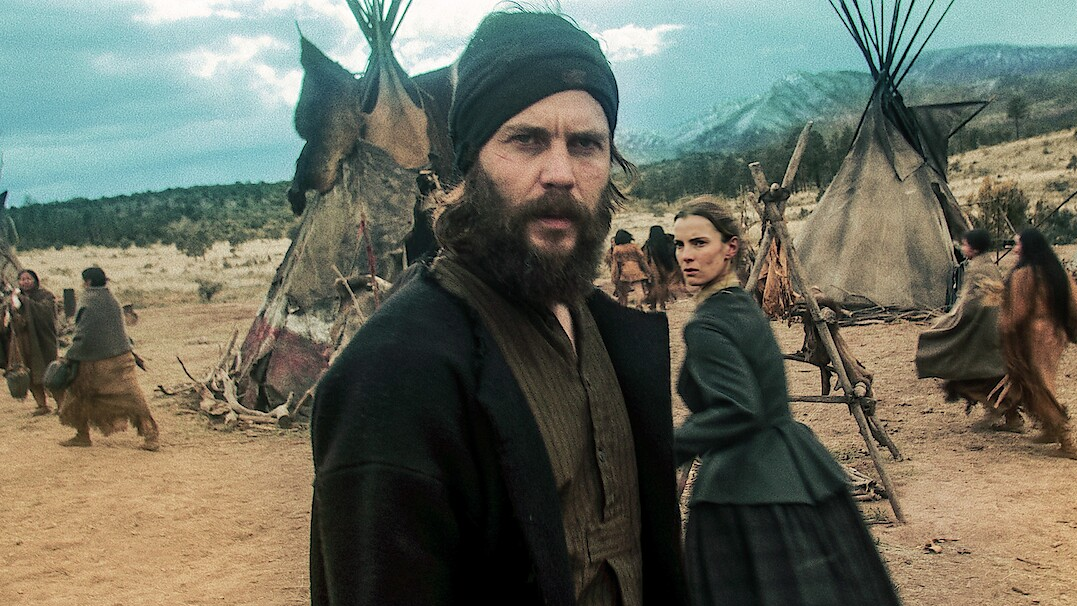This article contains major character or plot details.
Culture, religion, and community all collide in the limited series American Primeval, a harrowing dramatization of the deadly clash between Natives, pioneers, Mormon soldiers, and the US government in 1857.
Helmed by director and executive producer Pete Berg, writer and executive producer Mark L. Smith, and executive producer Eric Newman, the series — which is now streaming on Netflix — stars Taylor Kitsch, Betty Gilpin, Kim Coates, Shea Whigham, Saura Lightfoot-Leon, and Shawnee Pourier.
Berg found inspiration for American Primeval in 2020 after coming across a story about the Utah War. “I read an article on something called the Mountain Meadows Massacre,” Berg told Netflix. “[It] was something that interested me, and I started doing a lot of research on it.”
The executive producer reached out to The Revenant scribe Smith to flesh out his idea for an authentic and gritty show set on the American frontier. Unbeknownst to him, the show’s foundation was already set. While working on the 2015 film starring Leonardo DiCaprio, Smith read all about pioneer Jim Bridger (who features as a young boy in The Revenant) and wrote a pilot on the historical figure in 2016.
“I learned a lot about his character,” Smith told Netflix. “I knew I wanted to explore it more, and this gave me the opportunity.”
Smith set American Primeval’s story at Fort Bridger with the famed mountain man 50 years after the events of The Revenant and the rest is, well, history.
So, how true is American Primeval? Let’s dive into the real facts about the show below.
Which American Primeval characters are based on real people?
Jim Bridger (Shea Whigham)
The real-life pioneer found himself in the middle of warring factions, including Natives, Mormons, and the US government, after building Fort Bridger into a small city on the edge of civilization.
Brigham Young (Kim Coates)
Young was the then leader of the Mormon church with his own army — the Nauvoo Legion. “For this type of story, it was very important that we stayed authentic,” said executive producer Smith. “Even for all the Brigham Young sermons and speeches, a lot of his dialogue I took directly from text — real sermons that he had given — and used his exact words.”
Wild Bill Hickman (Alex Breaux)
Hickman was a notorious lawman and a member of the Nauvoo Legion.
Winter Bird (Irene Bedard)
Although the Shoshone tribal chief is a fictional character in the show, she is based on a real chief who “was purported to be a lesbian [and had] multiple wives,” says Berg.
James Wolsey (Joe Tippett)
Wolsey is inspired by a man who “was actually executed for his role in the Meadows Massacre,” Newman reveals. “There’s always some air of inspiration [and] authenticity to each character. There’s no one in the show that feels like a construct that would not have been a part of the real story.”
Why is there conflict between the Mormons, the military, and the Native tribes in American Primeval?
Berg noted that in American Primeval, there are no heroes or villains, just people trying to survive.
“Brigham Young and the Mormons feel as though the military is about to attack them at any point in time, so they’ve started their own army called the Nauvoo Legion,” he explained. “The American Army is concerned with getting the Mormons out of Utah territory, so they’re nervous that they’re going to die fighting the Mormons. The Shoshone and the Paiute tribes are being squeezed from their lands by both sides, so they feel like they’re getting ready to die. The miners and the trappers at Fort Bridger are all seeing their lives extinguished by larger trapper companies who are coming in and squeezing them out. Everybody is anxious from the get-go and everyone is truly fighting to stay alive.”
Is the Mountain Meadows Massacre based on a true event?
In the show’s first episode, a frantic Sara (Betty Gilpin) and her son Devin (Preston Mota) race to find cover as arrows zip through the air and bodies fall all around them. The scene, which depicts Mormon soldiers dressed as Natives attacking a group of pioneers headed further west, is inspired by real events.
“We chose that because there was this intersection between a few different Native nations, the US government, the Mormons, and the American citizens who felt they had the right to move through this area,” Newman explained. “The Mountain Meadows Massacre did happen … and it became, for our narrative purposes, an inciting incident of conflict for our cast of characters.”
Smith added that they aimed to depict a balanced retelling of history. “It was driven by the Nauvoo Legion, but we have to understand that they perceived it as a threat,” he said. “They were coming in to defend their world. It is just another step — a very violent step — in the lengths that they went to.”
The Mountain Meadows Massacre sequence was a huge undertaking that required about four months of planning and featured roughly 280 actors striking all at once.
“It’s very violent, it’s very chaotic,” Berg noted. “We designed one large shot that goes on for about six or seven minutes. We play the attack in real time, and we stay with Sara and Devin, just trying to survive. That was the strategy: Let’s visually present this event through the eyes of this woman. There was a lot of work blocking it, choreographing the action, then figuring out how and where the camera moves within a series of five or six shots that had to be stitched together.”

See the Territory of American Primeval
Is Fort Bridger based on a real place?
Yes. In the 1850s, the real Fort Bridger was a trading post for those migrating West.
“It was used by all the pioneers [and] the Mormons. It was the stopping ground,” Smith said. “When President Buchanan decided he wanted to get control of Brigham Young and what was growing in Utah, he stationed his military there. Fort Bridger was the gathering point for everyone.”
It took a collaborative effort to build the Fort Bridger set in New Mexico, where American Primeval was filmed. “There are hundreds of massive, 80-foot trees that were used to build the walls around Fort Bridger,” Berg divulged. “Back in the 1850s, there were no power tools so that had to be cut by hand with axes, and those construction guys were out there every day building that set with hand tools.”
The set was built larger in scale than the real Fort Bridger, Smith said, because “we wanted to have so much life there. It became like a small village. We had shops, and we had a dentist and a doctor, and baths and things that were accurate to that time period. Fort Bridger took on a life of its own.”
Why did Jim Bridger sell Fort Bridger?
In Episode 6, Jim Bridger sells his fort to Brigham Young and disappears into the wilderness as it burns to the ground. That, too, was based on real events.
“Fort Bridger was perceived to be this incredible asset by the US military and the Mormon church in terms of their ability to defend each other,” Berg tells Tudum. “Bridger knew this, and he held out as long as he could. [He] took the best deal he could and rode off for perhaps one last chapter of his life.”
Smith explained that Brigham Young purchased the fort to “take control of it himself. Not for profit, necessarily, but to get rid of it so that the [US army] wouldn’t be able to use it. At that point, for Brigham Young, it was a defense from the outside world.”
So, did the filmmakers actually burn down the Fort Bridger set? “We burned down about half of it,” Berg shares. “It was based on a true event.”

The Making of American Primeval
What research went into the making of American Primeval?
To lean into the show’s authenticity, American Primeval’s creatives enlisted experts across all aspects of production. “We had military consultants, we had Mormon consultants, we had trapper consultants, and they were all on set,” Berg explained. “I went with Dudley Gardner, the curator of the Bridger museum, to Fort Bridger in Wyoming for five days to get a deeper education into what life was like on that fort.” The EP then toured the site of the massacre with Richard E. Turley Jr., the co-author of Vengeance Is Mine: The Mountain Meadows Massacre and Its Aftermath, to learn more.
Berg also turned to consultants from the Shoshone Tribe and the Paiute Tribe, who were managed by Indigenous cultural consultant and project advisor Julie O’Keefe.
“My job on the show was to manage organized teams of cultural experts from the Tribes involved,” O’Keefe told Netflix. “Artisans, traditional language speakers from each Tribe, and cultural experts were engaged to create and advise every department. I also researched and used my network to create authentic camps for the Shoshone, Southern Paiute, and Ute with [production designer] Renée Read for set design, and I worked with [costume designer] Virginia Johnson to help produce period-specific traditional clothing for principal characters and background characters.”
In addition, she “resourced materials such as buffalo hide, elk skin, buckskin, beads, broadcloth, and blankets, following photos and research done by Virginia and the other department teams.”
Added Newman, “Everything was entirely geared towards authenticity. Every department did a tremendous amount of research. We had to make all these things you see on-screen. All of these elements had to be built. It’s incredibly time-consuming, but essential, because if someone shows up with some article of clothing or a weapon that didn’t exist in 1857, you’ve already lost.”
Is there any truth to Abish’s story?
Abish’s (Lightfoot-Leon) story arc was inspired by historical accounts of women who were abducted by Natives in what is present-day Utah. “We wanted to explore the idea of this young Mormon woman who’s being kind of pushed into a life and a marriage that she did not ask for, and through fate, ends up in a much different world and never fully assimilates,” Berg says.
What should viewers take away from this story?
“I think human triumph, the reinforcement of the good that people are capable of, is very important to me as it is to Pete,” says Newman. “The other part of what matters to me is the importance of an anti-nostalgic, truthful look at our history. I was a big Howard Zinn’s A People’s History of the United States fan because it was the first time I was confronted with what I believed to be the truth. That these rose-colored glasses in which we view the past, from the first Thanksgiving onward, is a lie. It’s a lie meant to make us feel good about this really rugged, brutal path that we’ve taken.”
He adds, “I think we do a disservice to ourselves by looking at it in that way because it prevents us from seeing it [happening] again.”
All six episodes of American Primeval are now streaming on Netflix.
Additional reporting by Keely Flaherty and Tara Bitran.

Watch the American Primeval Season 1 Trailer
